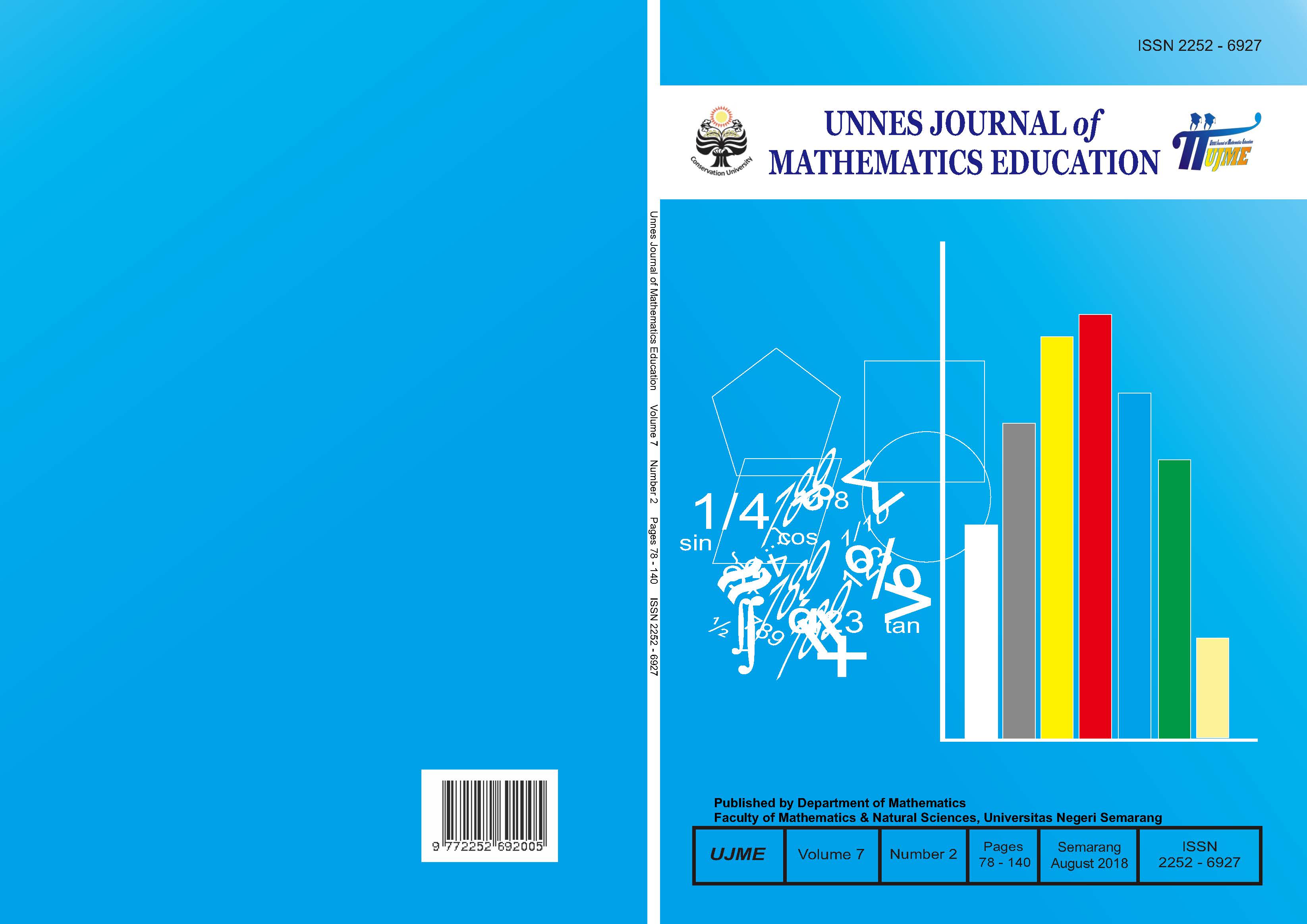The effectiveness of problem based learning with authentic assessment towards students’ mathematical problem solving ability at 11th grade of Tran Nhan Tong Senior High School in Ho Chi Minh City, Vietnam
##plugins.themes.academic_pro.article.main##
Abstract
The purpose of this research was to find out whether Problem Based Learning (PBL) learning with authentic assessment affects the students' mathematical problem solving ability. The method of this research was quantitative research method. Its population was 11th grade of Tran Nhan Tong Senior High School Ho Chi Minh City, Vietnam in academic year 2017/2018. By using the cluster random sampling, class 11A1 was selected as a control class that gained conventional learning in Vietnam, class 11A2 as an experiment class 1 that obtained PBL learning with authentic assessment, and class 11A3 as experiment 2 class that obtained PBL learning. The data collection techniques were documentation and test method. The result of the research showed that the result of mathematical problem solving test at the experiment class 1 successfully reached classical completeness more than or equal to 75% of the students in the class, and students’ mathematical problem solving ability at the experiment class 1 was better than at the experiment class 2, while students’ mathematical problem solving ability at the experiment class 2 was better than at the control class.
##plugins.themes.academic_pro.article.details##
References
Argaw, A. S., Haile, B. B., Ayalew, B. T., & Kuma, S. G. (2017). The Effect of Problem Based Learning (PBL) Instruction on Students’ Motivation and Problem Solving Skills of Physics. Eurasia Journal of Mathematics, Science and Technology Education, 13, 857-871.
Asikin, M. (2012). Daspros pembelajaran matematika I. Semarang: FMIPA Unnes.
Asikin, M., & Junaedi, I. (2013). Kemampuan Komunikasi Matematika Siswa SMP dalam Setting Pembelajaran RME (Realistic Mathematics Education). Unnes Journal of Mathematics Education Research, 2(1), 203-213.
Azim, S., & Khan, M. (2012). Authentic assessment: An instructional tool to enhance students learning. Academic Research International, 2(3), 314.
Barber, W., King, S., & Buchanan, S. (2015). Problem Based Learning and Authentic Assessment in Digital Pedagogy: Embracing the Role of Collaborative Communities. Electronic Journal of e-Learning, 13(2), 59-67.
Dunga, T. M., & Baob, P. M. (2017). Vietnamese students’ problem-solving skills in learning about error of measurements. IEJME, 12(4), 463-474.
Duong, M. Q. (2016). The Effects of Academic Learning on Problem-Solving Efficacy of Vietnamese University Students: A Case Study of Vietnam National University–Ho Chi Minh City. Educare, 5(2), 161-172.
Gravemeijer, K., Stephan, M., Julie, C., Lin, F. L., & Ohtani, M. (2017). What Mathematics Education May Prepare Students for the Society of the Future?. International Journal of Science and Mathematics Education, 15(1), 105-123.
Hodgman, M. R. (2014). Using Authentic Assessments to Better Facilitate Teaching and Learning: The Case for Student Portfolios. Journal of Studies in Education, 4(3), 59-65.
Masrukan. (2014). Asesmen Otentik. Semarang: FMIPA UNNES.
Maretasani, L. D., Masrukan, M., & Dwijanto, D. (2016). Problem Solving Ability and Metacognition based Goal Orientation on Problem Based Learning. Proceeding of ICMSE, 3(1).
Munawaroh, S.B., Y.L Sukestiyrno, & Masrukan. (2017). High School Mathematics Curriculum Development Integrated with Character Education Within Project Assessment as Spiral System Leveled. Unnes Journal of Mathematics Education, 6(2), 163-173.
National Council of Teachers of Mathematics (Ed.). (2000). Principles and standards for school mathematics (Vol. 1). National Council of Teachers of.
Purnomo, D. J., Asikin, M., & Junaedi, I. (2015). Tingkat Berpikir Kreatif pada Geometri Siswa Kelas VII Ditinjau dari Gaya Kognitif dalam Setting Problem Based Learning. Unnes Journal of Mathematics Education, 4(2), 109-115.
Rifa'i, A. & C.T. Anni. (2012). Psikologi Pendidikan. Semarang: Pusat Pengembangan MKU/ MKDK-LP3 Universitas Negeri Semarang.
Rusyida, W. Y., Asikin, M., & Soedjoko, E. (2013). Komparasi Model Pembelajaran CTL dan MEA terhadap Kemampuan Pemecahan Masalah Materi Lingkaran. Unnes Journal of Mathematics Education, 2(1), 1-7.
Suryati, S., Masrukan, M., & Wardono, W. (2013). Pengaruh Asesmen Kinerja dalam Model Pembelajaran ARIAS terhadap Kemampuan Pemcahan Masalah. Unnes Journal of Mathematics Education, 2(3), 1-13.
Ulya, H. (2012). Keefektifan Penerapan Model Pembelajaran Kooperatif Tipe Probing-Prompting Dengan Penilaian Produk. Unnes Journal Of Mathematics Education, 1(1), 26-31.
Vuong, X. K., & Duong, M. Q. (2013). The Relationship between University Learning Experiences and Students’ Problem-solving Efficacy in the University of Social Sciences and Humanities of Ho Chi Minh City. Asian Journal of Education and e-Learning, 1(04), 172-177.
